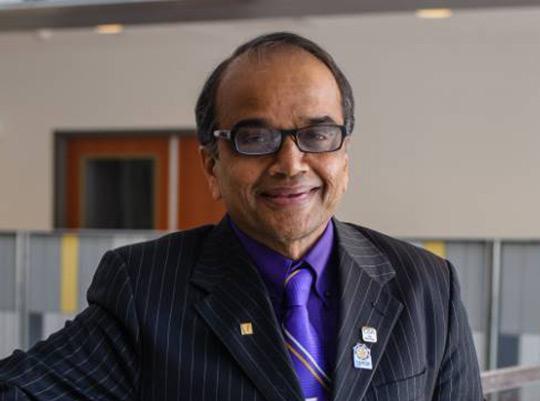Alfred University’s Sundaram part of team of researchers awarded $4 million federal grant

A group of researchers including S.K. Sundaram, professor of materials science and engineering at Alfred University, are the recipients of federal grant that will be used to study ways to convert used nuclear fuel into a safely disposable waste form.
ALFRED, NY – A group of researchers including S.K. Sundaram, professor of materials science and engineering at Alfred University, are the recipients of federal grant that will be used to study ways to convert used nuclear fuel into a safely disposable waste form.
The U.S. Department of Energy recently announced the awarding of $36 million to 11 projects through the Advance Research Projects Agency-Energy (ARPA-E) “Optimizing Nuclear Waste and Advanced Reactor Disposal Systems” (ONWARDS) program. Unveiled by the DoE last year, the ONWARDS program was created to identify and facilitate technologies for advanced research on used nuclear fuel (UNF) recycling, waste forms, UNF disposal pathways and associated advanced safeguards technologies.
A multi-disciplinary team that includes Sundaram was awarded $4 million to fund a three-year project (2022-25) focused on PIONEERING A CERMET WASTE FORM FOR DISPOSAL OF WASTE STREAMS FROM ADVANCED REACTORS (PACE-FORWARD). The group is represented by researchers from Rutgers University (lead), Alfred University, University of South Carolina, Missouri University of Science and Technology, Washington State University, Savannah River National Laboratory, and Pacific Northwest National Laboratory.
Sundaram is a co-principal in investigator on the project, as are two other alumni: Jake Amoroso ’03 (glass science engineering) ’10 PhD (materials science and engineering) at Savannah River National Laboratory; and John Vienna ’91 (ceramic engineering), ’93 M.S. (ceramic engineering) at Pacific Northwest National Laboratory.
The PACE-FORWARD project seeks to deliver a simple, scalable route for turning used nuclear fuel into high-density, durable cermet (a heat-resistant ceramic and metallic composite) waste form. The project is expected to lower waste burden and sustain future deployment of carbon-free nuclear power.
Alfred University’s share in the grant is approximately $500,000. According to Sundaram, “the research will leverage extensive processing capabilities” such as spark plasma sintering (SPS), hot isostatic pressing (HIP), and state-of-the art high temperature characterization tools at Alfred University and partnering institutions, “to produce highly engineered cermets into which a variety of ceramic and metallic phases from wastes could be incorporated into a single waste form.”
Sundaram explained that “early versions” of cermet samples will be produced and characterized in labs at Alfred University. “Our samples will be shared with the entire team for various advanced characterizations at other institutions.”
Full-time graduate and undergraduate students will work on research conducted at Alfred University. “Collaborative publications and technology development and demonstration will be major outcomes,” Sundaram said.
ARPA-E has its roots in a 2005 report—titled “Rising Above the Gathering Storm: Energizing and Employing America for a Brighter Economic Future”—which was submitted by the National Academies of Sciences, Engineering and Medicine to the U.S. Congress. In the report, the National Academies called for decisive action, warning policymakers that U.S. advantages in science and technology--which made the country a world leader for decades--had already begun to erode.
The report recommended that Congress establish an Advanced Research Projects Agency (ARPA-E) within the U.S. Department of Energy (DoE), modeled after the successful Defense Advanced Research Projects Agency (DARPA). In 2007, Congress passed, and President George W. Bush signed into law the America COMPETES Act, which officially authorized ARPA-E's creation. In 2009, ARPA-E received its first appropriations of $400 million, which funded its first projects.
